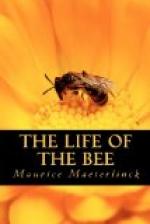[10]
What is this “spirit of the hive”—where does it reside? It is not like the special instinct that teaches the bird to construct its well planned nest, and then seek other skies when the day for migration returns. Nor is it a kind of mechanical habit of the race, or blind craving for life, that will fling the bees upon any wild hazard the moment an unforeseen event shall derange the accustomed order of phenomena. On the contrary, be the event never so masterful, the “spirit of the hive” still will follow it, step by step, like an alert and quickwitted slave, who is able to derive advantage even from his master’s most dangerous orders.
It disposes pitilessly of the wealth and the happiness, the liberty and life, of all this winged people; and yet with discretion, as though governed itself by some great duty. It regulates day by day the number of births, and contrives that these shall strictly accord with the number of flowers that brighten the country-side. It decrees the queen’s deposition or warns her that she must depart; it compels her to bring her own rivals into the world, and rears them royally, protecting them from their mother’s political hatred. So, too, in accordance with the generosity of the flowers, the age of the spring, and the probable dangers of the nuptial flight, will it permit or forbid the first-born of the virgin princesses to slay in their cradles her younger sisters, who are singing the song of the queens. At other times, when the season wanes, and flowery hours grow shorter, it will command the workers themselves to slaughter the whole imperial brood, that the era of revolutions may close, and work become the sole object of all. The “spirit of the hive “is prudent and thrifty, but by no means parsimonious. And thus, aware, it would seem, that nature’s laws are somewhat wild and extravagant in all that pertains to love, it tolerates, during summer days of abundance, the embarrassing presence in the hive of three or four hundred males, from whose ranks the queen about to be born shall select her lover; three or four hundred foolish, clumsy, useless, noisy creatures, who are pretentious, gluttonous, dirty, coarse, totally and scandalously idle, insatiable, and enormous.




